Imagine this. You go to a search engine and search ‘best blogging platforms’. Obviously, you would have search results, right?
But what if there are no search results?
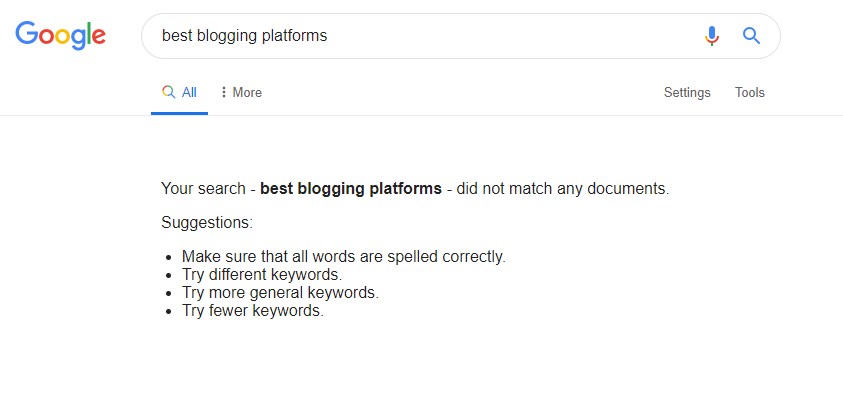
Pretty weird, right?
So how is it that so much information is available on the internet and you are able to get access to everything?
Well, it’s because of blogging and bloggers!
Blogging is a very diverse niche that is responsible for the presence of most of the content on the internet.
Right from unique content creation to the sale of some of the most interesting products, marketing them or for affiliate marketing, blogging revolves around everything.
It’s 2020 and blogging has changed, A LOT!
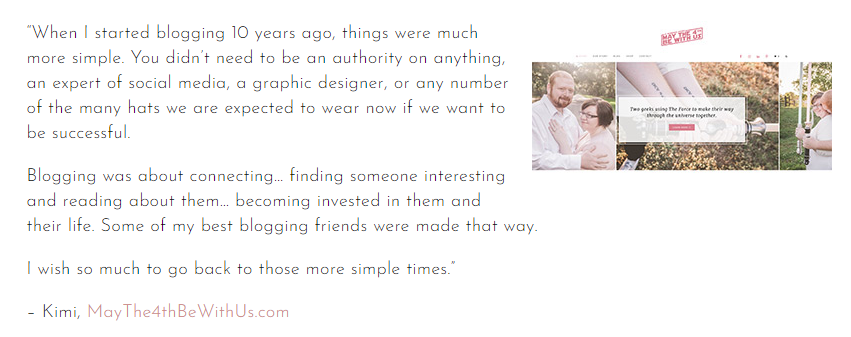
I found this interesting post about how blogging changed over the years and it turns out that blogging is not just about good content anymore.
With the growth of internet users and search engines becoming smarter, there are a lot of things that kept on changing over the last few years.
Where it was easy to build a blog and post content of your choice, now it’s more about advertising your content in the constant hope of building such an audience that you can eventually monetize, at least for most of the tech blogs I came across.
Before I start mentioning the best blogging platforms 2020, let’s try to understand blogging a little more.
Blogging: What is the current scenario in 2020?
Right from its origin, blogging has become one of the most popular methods of starting something of your own that could stabilize you financially.
For starting a blog, all you need is:
- Identify your interest.
- Pitch that interest towards a niche.
- Good communicative skills.
- Understanding what blog platform would be the best for you.
People start their own blogs for different purposes. Some are interested in the idea of getting their thoughts out to the common people, some are involved in it as a hobby while most of the people now are in it because of money.
Let’s be honest. Nobody hates money. It’s okay to admit you are in it for the money because most of the people are.
When people realize that not only can they describe their point of view over different topics, but also monetize the same and actually become self-sufficient, it becomes a win-win for them.
Blogs like Mashable make over $2,000,000 a month. That’s an insane number! And that’s just the tip of the iceberg.
You would find a lot of posts on the internet where they mention the top-earning blogs. Let’s skip the long lists and understand it briefly.
Here’s a list of some of the top-earning blogs:
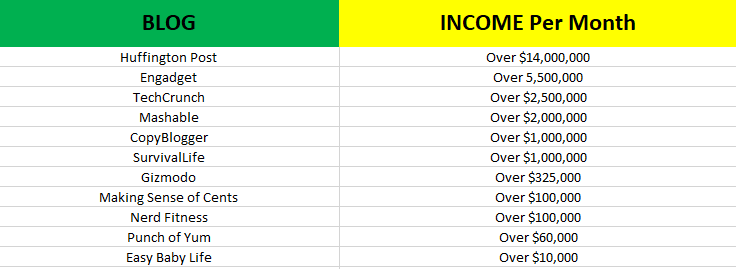
The list is long but the idea is pretty simple. If you are to start a blog of your own, it means now more than ever, you have to think every process through before starting a blog.
As you get the idea of starting a blog, the first thing that you should ask yourself is what kind of a blog you would be having?
Is it about a common topic like tech where all you have to do is to write blog posts and make a decent interface?
Or are you going to develop a niche-specific blog like HubSpot where you are going to need a lot of features in order to enable certain functions on your site?
Whatever it is, the first thing you have to do is to understand what kind of blogging platform you require and if it’s going to cater to the needs that have?
How to choose the right blogging platform in 2020?
With the abundance of blogging platforms available, it’s pretty obvious that you’d have to pick your preferred blogging platform clearly.
To point you in the right direction, here are some of the important questions you’d want to ask yourself before settling for a specific blogging platform.
Can your blogging platform make money?
It’s obvious that with more traffic and readers, you would want to monetize your blog. And if that’s the case, the platform that you’re using should be able to make you money.
Platforms like Blogger and WordPress allow you to integrate ads easily within the site.
Here is a common example of a typical Google ad on your site.
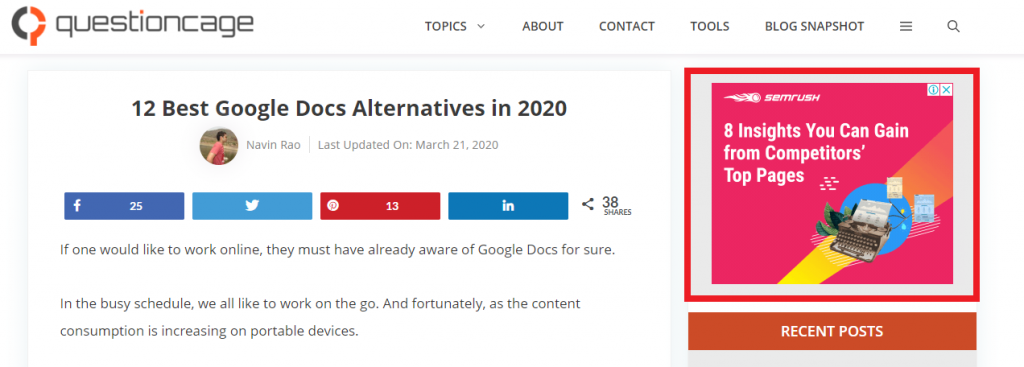
For a blogging platform to be complete, it should also allow you to integrate all kinds of ads and HTML code in your site that you could use to monetize your site with.
Can it sustain in the long run?
For a beginner, the first preference before starting a blog of their own is settling for free blog sites.
Do I recommend it?
No!
Starting off with a free blog site might seem like an intimidating an easy option, but in the long run, you might end up regretting the same.
When you start a blog on a free platform, you might not have access to some of the features that you’d need to sustain your blog in the long run.
At first, setting up your blog with a basic theme and adding some blog posts might seem easy.
But as (and if) you start getting traffic, soon enough you might need different customization and a more professional-looking blog, which usually isn’t an option in most of the free blog platforms.
This necessarily doesn’t mean I ask you to spend a lot of money on hosting platforms and domains, no!
Most of the bloggers start with a basic hosting plan and a specific domain that is perfect for some time.
And with the substantial growth, you can move towards a better plan than you currently are on.
Does it complement your niche?
A lot of niches require different kinds of platforms to help them in their future plans.
Let’s break it down.
Suppose you own a basic blog where you post daily content, get email subscriptions and generally sell a couple of products (like website merch or say an eBook).
These kinds of blogs can work out on any kind of blogging platforms.
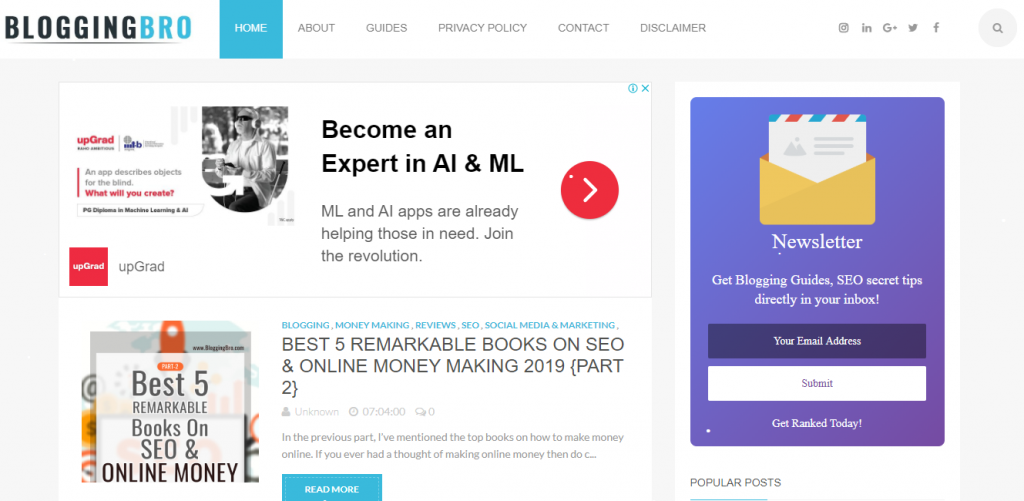
Take the above site as an example. It’s a basic blogging guide site that features ads, has basic blog posts, a menu and a logo. These kinds of blogs could be hosted from basic blogging platforms like blogger.
However, for a more advanced blog, where you need more features, you might require additional resources and features, something you might not be able to get from free blogging platforms.
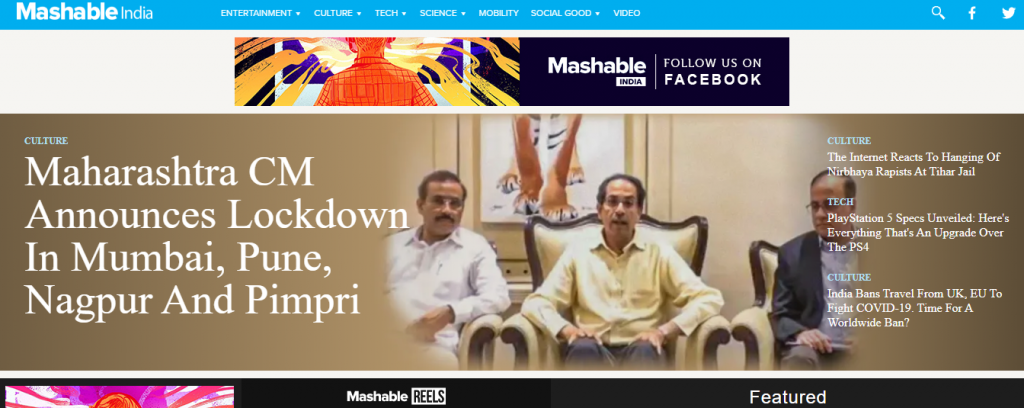
You can also choose the right platform for you based on the type of customization you would need. Suppose you need a fully-customized blog. In such a case, you can settle for WordPress than Blogger (which is a free blogging platform).
Is it easy to understand and use?
When I started blogging back in 2016, I didn’t know a thing before starting. All I did was make an account in ‘Blogger.com’ and wrote down whatever I knew about my preferred niche at the time.
And let me be honest, it didn’t look good at all.
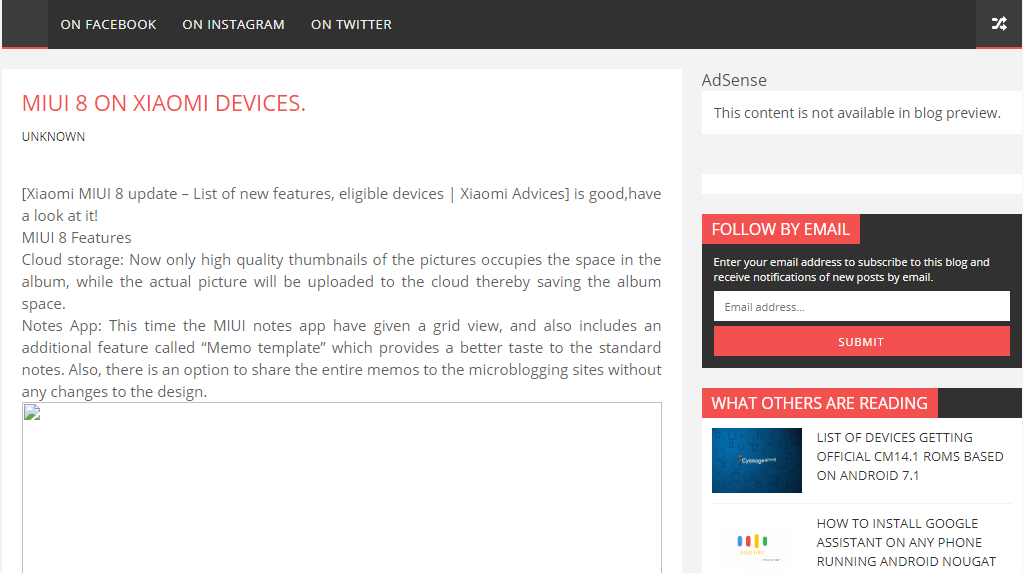
This is still a good version with a decent theme. Trust me, it looked way shabby than this.
I wasn’t familiar with the features of ‘Blogger.com’ at all.
Though with time, I learnt a few things and decided to make my blog give a more professional look and moved to a different hosting platform (which I will mention later in this post).
So, the bottom line is that you need to settle for such a platform that would be able for you to understand. You don’t need enormous guides over ‘how to use so-and-so blogging platform’. All you need is some basic knowledge. Everything else would come on the way.
As you are clear what you need in a blogging platform, it’s time that we go through some of the top blogging platforms 2020 and pick the right one for you.
BEST BLOGGING PLATFORMS 2020
1. WordPress.org

WordPress is the most popular blogging platform globally. ‘How popular?’ you may ask.
Well, WordPress powers 35% of the websites in the world. This is a gigantic number.
Major websites like Beyonce Vogue, BBC America, Rolling Stone etc. have their official blogs hosted from wordpress.org.
The reason it has an increasing amount of users is because of the complete customization and control it provides. I have been using WordPress for about 3 years and I can’t find a better platform than it.
Another major reason why people prefer WordPress is because of the ease of use. Everything is so easy to set up that you can build a basic, simple blog with just a few hours of work.
Then there are plugins and themes that make your work even easier as you are able to include additional features in your blog.
People also choose WordPress because of the support it has. Whatever issue you face with WordPress, you can find a solution for it around the communities on the internet.
For the readers who aren’t familiar with WordPress yet, I am sure you would easily confuse between wordpress.com and wordpress.org.
Yes, there are two versions of WordPress. And how are they different? Let me tell you.
WordPress.org provides a lot of features as that of the .com counterpart. However, it also gives you an option of enabling extended features. But for that, you would have to purchase a web server and a domain name.
WordPress.org is still the more prominent option as you have complete control over the customization of your blog and would be able to monetize your website easily.
You might take some time though to learn and understand WordPress completely and build a complete site. But once you are done, you can easily build one of the best blogs on the internet.
Pros
- There are thousands of free and paid plugins to customize your site.
- You get a 100% control over your blog.
- An easy to use and navigate the dashboard.
- WordPress is SEO-friendly. The control over URLs and the ability to customize them gives you a benefit while ranking for different types of keywords.
- Aside from blogging, you can also build websites, online stores and forums on WordPress.
Cons
- Backup and security of your blog and content are up to you.
- If you are new to WordPress, it might take some time for you to get familiar with its features.
- You need a good hosting provider.
Tip: I have seen a lot of bloggers in their early stages using a lot of plugins or experimenting with different themes. That’s okay, but in the long run, it affects the loading time of your blog. Either get rid of the extra plugins or move to a faster hosting service than what you currently are using.
2. Blogger.com
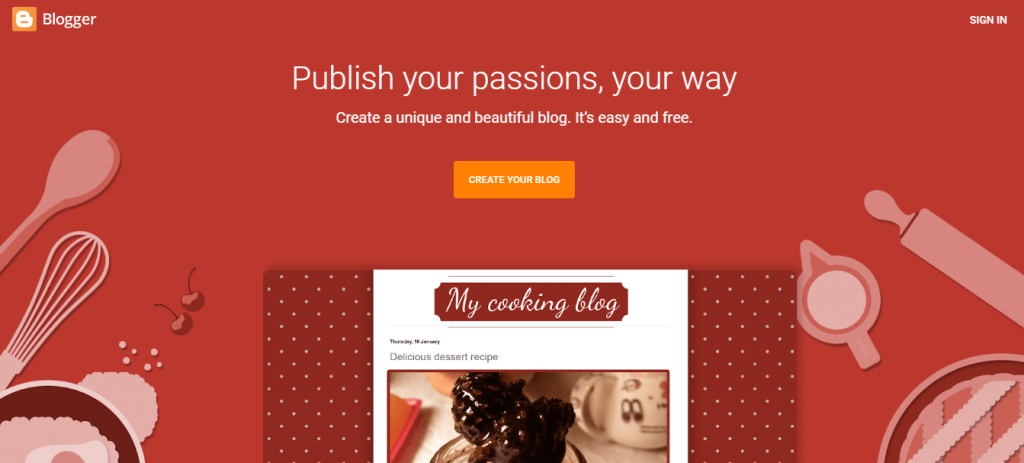
Just like I mentioned, I started my first blog on Blogger.com. While it wasn’t one of the best blogs, it sure was okay for a beginner. For my type of blog that required blog posts, social media icons, a search button, a menu and a subscription box, Blogger.com was the best choice and above all, it was FREE!
And assuming you are a beginner, you might want to get your start on Blogger as well.
But, was Blogger everything that I wanted?
At first, yes!
Blogger is an official blogging platform from Google and if you stick to its free version without connecting a domain, you would have a subdomain that would go like – yournewdomain.blogspot.com
Blogger.com was launched in 1999 and Google took over in 2003.
You can write blog posts within the editor, add images and even monetize your site through Google Adsense, as that’s an in-built feature in Blogger.com.

I liked Blogger.com for its simplicity.
And do I recommend using it now? Well no!
Blogger.com is fairly simple and easy to use. But the major drawback is that it has limited customization.
There are very limited features available on Blogger.com. If you need to add additional features, you might have to tamper with the CSS code, which is an impossible task for bloggers that are not familiar with such elements of a blog.
The character limit, lack of support and very outdated interface don’t make it a great option overall.
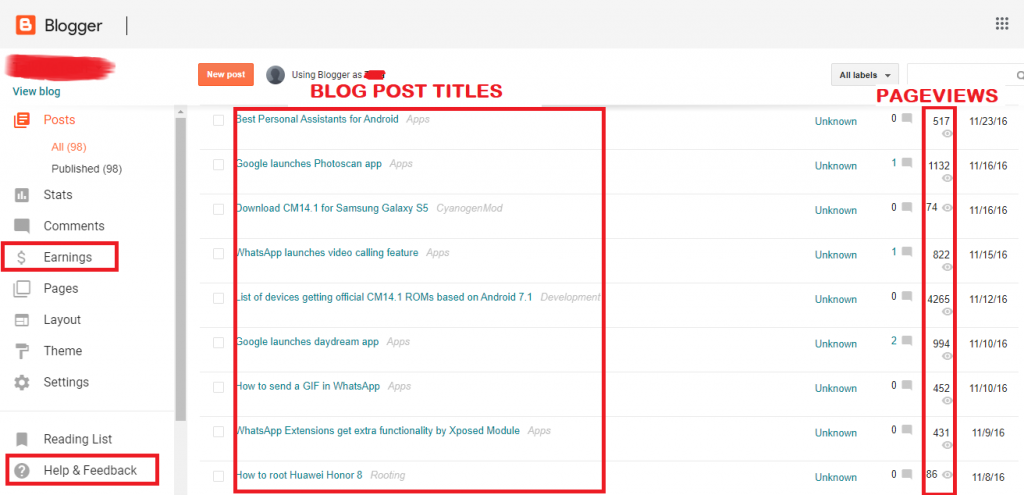
I stuck to Blogger for a year and ultimately decided to host my blog somewhere else because I wasn’t able to customize my blog the way I wanted to. And I am sure most of you would feel the same way.
So, who is blogger.com meant for?
Blogger is a great tool but likely meant for the non-technical users who can’t dedicate a lot of time towards the creation of a blog.
It does let you share the content pretty quickly, but if presentation and audience retaining and engagement is not something that you are targeting, you can definitely settle for it.
People use it different kinds of purposes and a lot of times, just as their hobby rather than any kinds of monetization plans.
Pros
- It is very simple and easy to use.
- It is free and a great option for beginners.
- 100% uptime support from Google.
- No technical knowledge required.
Cons
- Very limited customization.
- You won’t have access to the latest blogging tools available on other platforms.
- Very few templates are available that don’t make a very good first impression to the users.
- Your project (or even the whole platform) could be suspended.
Tip: I know most of you would be using Blogger.com. While it’s easy to stay on the platform, I recommend you migrate to a different platform which is more secure, updated and provides you with better features than what you are getting in Blogger.
3. Wix
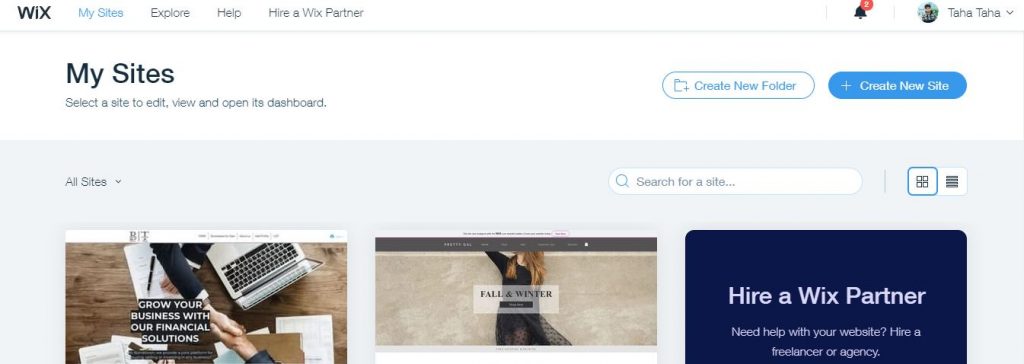
With over 100 million users, Wix is another great blogging platform which is famous for its drag and drop features.
The most significant feature of Wix that I really loved was the ease of customization. Whatever feature you want to add and integrate into your website, you can do it without the installation of a plugin.
Wix is a great platform overall with tons of features, updated website templates, responsive layouts and affordable pricing plans.
When you choose a premium plan, you get a domain for free which is a great deal, to be honest.
While Wix is easily customizable, it is widely used for building e-commerce websites.
The best thing about Wix is that there are more than 5000 templates for different kinds of purposes and for the sake of building a unique e-commerce store.
Right from t-shirt selling sites to any other kind of unique online store, everything is made easy with Wix and there’s no reason for you to not try it.
However, there are a few complications with Wix that you are bound to witness while developing a site of your own.
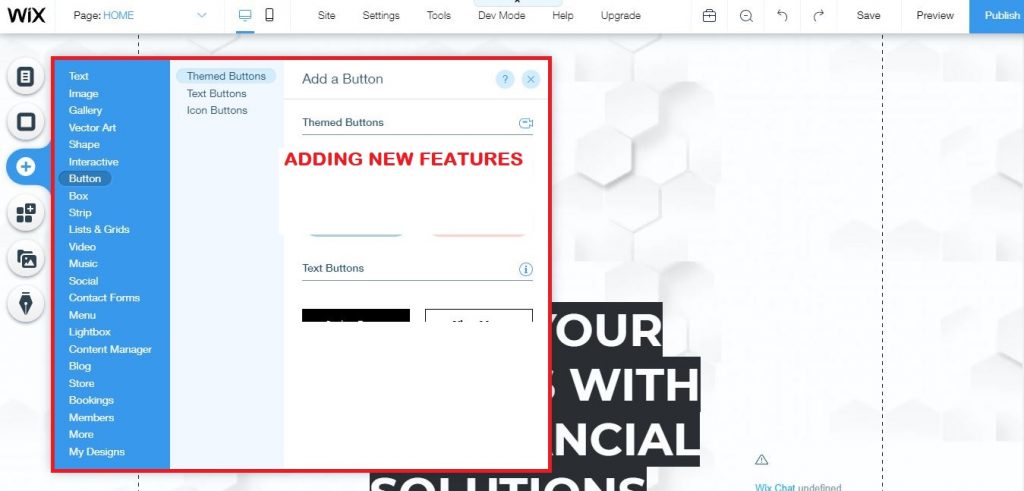
While adding a few features, you might not be able to figure out how to integrate certain functionalities into your website. But that won’t stop you because you can always hire a Wix partner to help you through any of the complications.
Wix obviously is directed towards the creation of websites and e-commerce stores, but that doesn’t mean you can’t use it for blogs.
Wix could easily be used for blog creation and making a very responsive design along with the integration of ads and other such features.
I was not a fan of the editor, but if you want a blog for your main website, Wix might be able to do the job just right.
Here’s what a typical Wix blog post looks like.

Pros
- Very easy to use.
- Drag and drop for easy integration of different features.
- You can integrate third-party apps and features.
- You get a free domain with the premium plan.
- Comes with tons of templates.
- Great for e-commerce purposes.
Cons
- Limited functionality.
- Hard to understand for beginners.
- You are stuck with a template when you choose it.
- You can’t migrate your site to another host.
4. Weebly
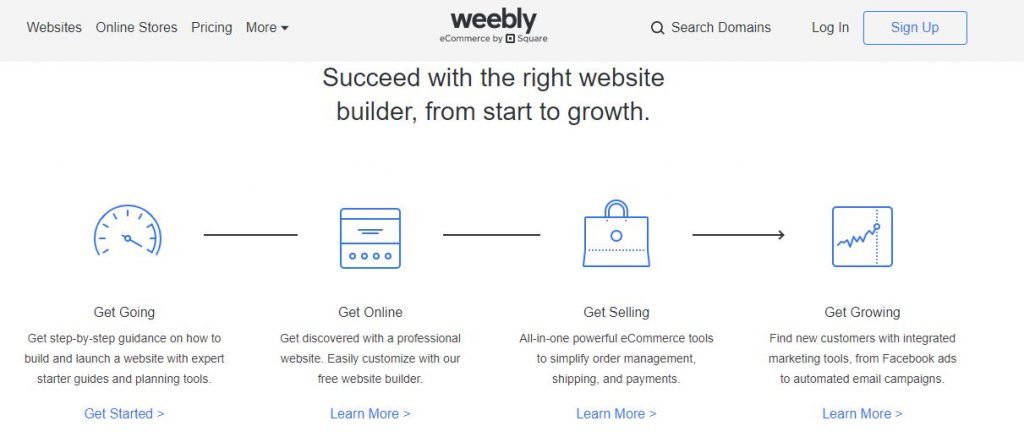
Weebly has around 40 million users and is one of the best options for you to settle for in case you want a professional-looking blog/website.
Weebly is home to some of the best blogs on the internet.
Right from the ability to search for domains of your choice (and buy them as well), to having a very friendly interface that’s very easy to understand for beginners, Weebly is a great option by all means.
You can make your own website or e-commerce store within a few hours. With hundreds of themes to choose from, you can develop your website with the help of integration of all kinds of features.
These include the adding of new pages, making customized menus, adding and choosing different colour schemes and adding sliders, videos, galleries and other such visuals that make your website look more professional.
Weebly is pretty much similar to Wix. And just like Wix, it has drag-and-drop features and is a great match for developing a business site.
Weebly could also be used for blogging and thus, the business owners find this platform very suitable to use than other kinds of blogging platforms where blogs and the main website are created separately.
Due to all these features, Weebly is a great choice but not as good as WordPress. But if you plan to make a free basic blog, Weebly might be a great option for you.
Pros
- Easy to use and beginner-friendly.
- Great pricing plans.
- A very appealing interface.
- Great SEO options.
Cons
- You can’t customize every part of your blog.
- Free themes are very limited.
5. Medium
Remember Blogger.com? It was brought to us by Evan Williams and Biz Stone and they are the ones who brought Medium to us.
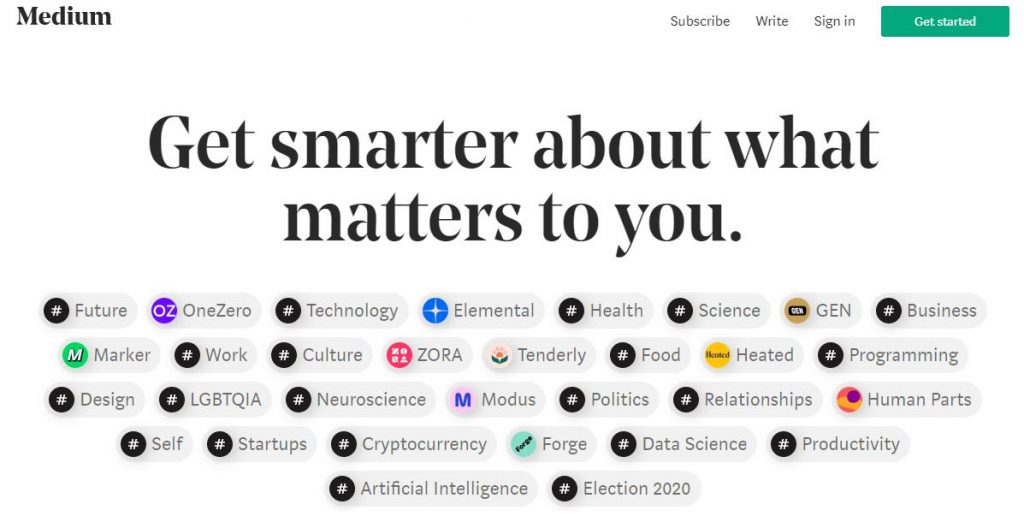
One of the best things about Medium is that it integrates with your Google or Facebook account, which saves you from the time wasted on remembering dedicates usernames and passwords.
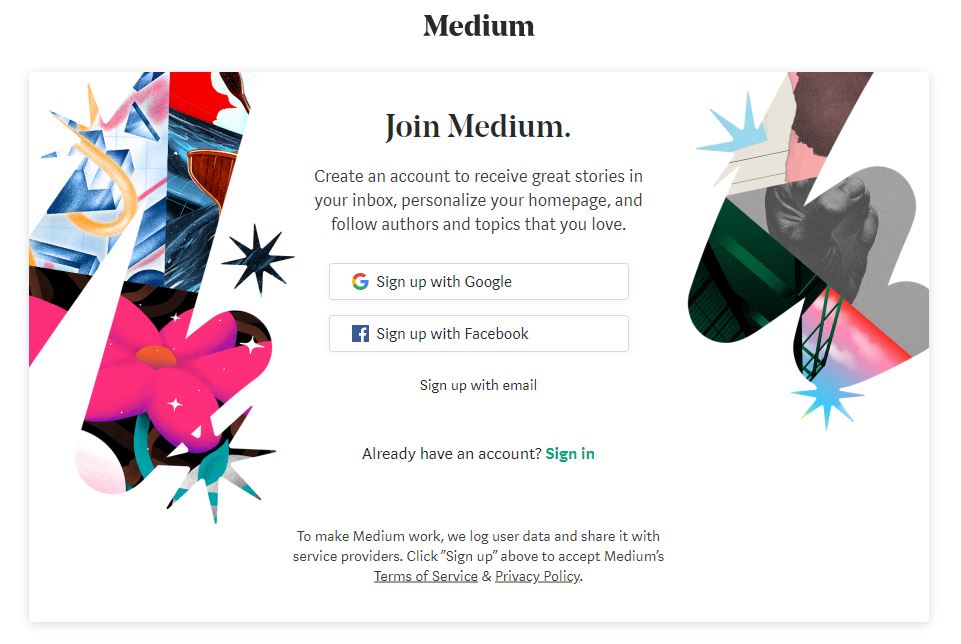
With a community of bloggers and writers on its platform, Medium is constantly growing. With its ease of use and simplicity, Medium is already a favourite of a lot of bloggers.
Let’s compare Medium with other blogging platforms that we discussed so far.
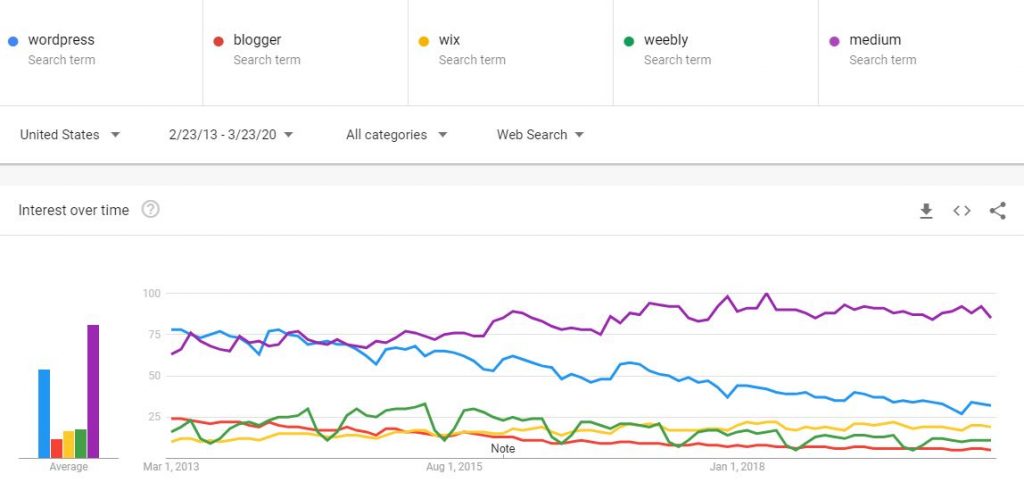
The above graph is taken from Google Trends. The time period is February 2013 to the current month, March 2020.
The term ‘Medium’ is displayed in a purple graph line which denotes the trend of searched and you can see clearly that it has maintained to gain popularity over the years, even more than WordPress as well. It is impressive growth for sure.
Along with that, Medium is a great resource for some of the best articles and guides on the internet. With dedicated blog posts over all the trending topics, Medium has maintained to be one of the best blogging platforms overall.
Pros
- Easy to set up.
- A great community with some of the best blogging tools.
- A great resource for bloggers and general information.
- Different designs are available.
Cons
- Lack of customization options.
- You can’t run your own ads to make money off the platform.
- Lack of HTML and CSS options.
6. Squarespace
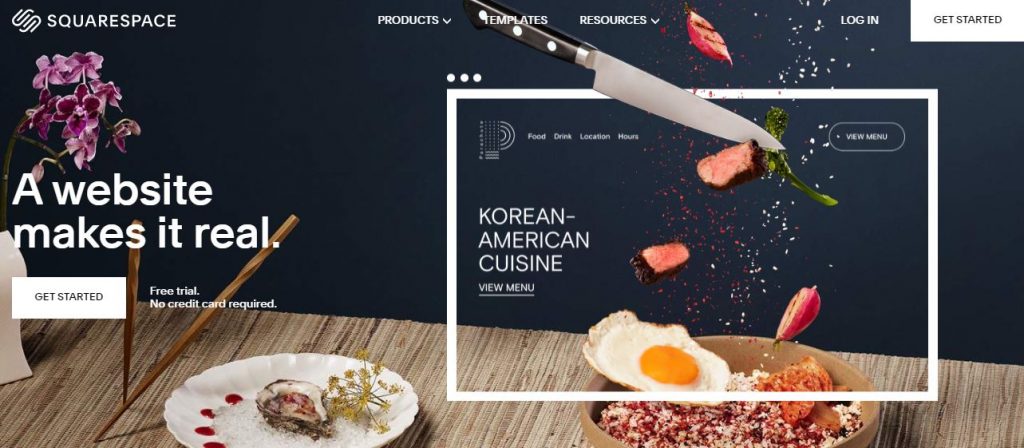
A lot of YouTubers and website owners were sponsored by Squarespace and well, I was curious!
With some research, I figured out that Squarespace was launched in 2004 and that it actually is an amazing platform, especially for small business owners.
Squarespace is an ideal option for you if your small business needs an online presence. One of the best parts of Squarespace is that you can customize your blog without even knowing anything about coding.
If you want to expand your business services, you should start your own website on Squarespace. It has some of the best features and you can even manage your website traffic, view its sources and sort from some of the most popular pages on your blog.
Squarespace is a great website builder and just like Wix or Weebly, you can add tons of extra features on your website.
One of the best things about Squarespace is the visual quality of the templates. Yes, there are paid templates, but the free ones are not bad either. These templates are so aesthetic and so amazing that they give a very polished and a professional look to your blog.
There’s also a free trial included in Squarespace.
However, it’s not that easy to understand for beginners. But with time and a few google searches, you can understand what goes where and build a complete blog eventually.
Pros
- Very easy to use.
- Great e-commerce compatibility and ideal for small business sites.
- Professional-looking templates with almost every feature you need.
Cons
- You can only use the in-built features as no third-party apps and features are allowed to be integrated.
- A limited number of pricing plans.
- Kind of difficult to use for a beginner as compared to Wix or Weebly.
7. Tumblr
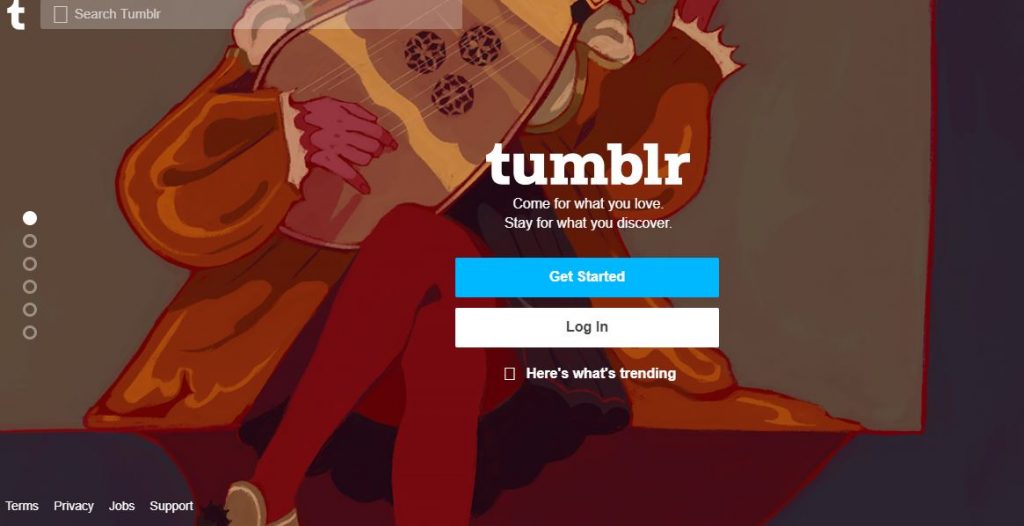
Tumblr is directed to the community of bloggers, especially microblogging.
It has a lot of social networking features and follows other blogs and a lot more. Tumblr has a lot of younger audiences and boasts more than 450 million different blogs.
Tumblr is very simple to use and if you are a beginner, you should give it a shot. Tumblr also gives you a free website. However, you don’t own the content or the website as a whole.
Tumblr is a great platform for sharing general content on the internet and reblogging at the same time.
However, the content is more of pictures and GIFs over text. If you are a writer, this platform might not be the best blogging platform for you.
Tumblr is very easy to use, free to use and could be used over mobile devices at the same time.
But to be honest, if you want full control over your content and your blog, Tumblr might not be the best option for you.
And also, you can’t monetize your blog.
Pros
- Tumblr is free and you can connect a custom domain as well.
- Very easy to set up.
- Hundreds of themes to choose from.
- GIFs and pictures are available in abundance.
Cons
- A limited set of features.
- Backing up your content isn’t easy.
- Not easy to monetize.
- Not easy to blow up on the platform.
FINAL VERDICT
With these blogging platforms I featured, I am pretty sure you would be unsure about which platform to settle for.
So, let me pick the right one for you.
Considering you are a beginner (or even a professional blogger), you might want to settle for a secure, fast and easily customizable platform.
And to be fair, WordPress is one of the best blogging platforms to settle for.
WordPress has a team of experts that help you out with every possible issue you may run into. Along with that, it is easy to set up and has every popular plugin and feature that you would need.
If you are a blogger and want our readers to know more about some of the blogging platforms you use, why not share your story in the comments and let our readers know more about your journey!

